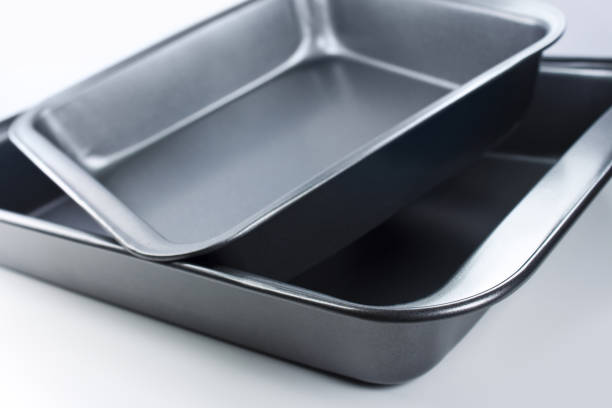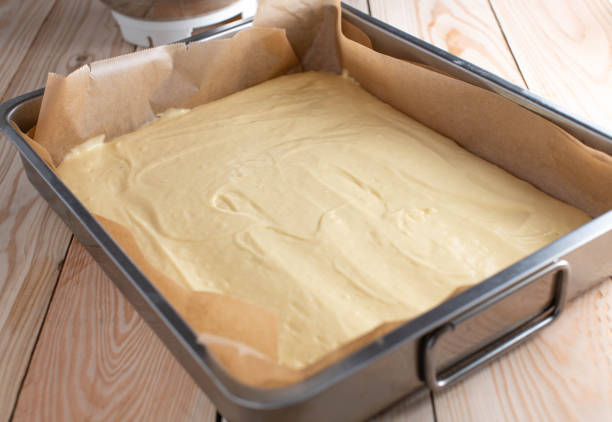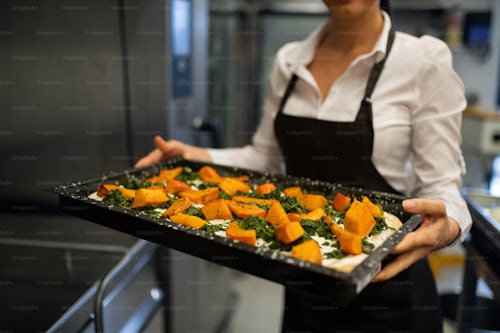Baking pans come in a variety of materials, but two of the most popular are stainless steel and aluminum.
When deciding which to use, it's important to consider the pros and cons of each.
Stainless steel baking pans have their advantages, such as being strong and durable. However, they can also be expensive and difficult to clean.
On the other hand, aluminum baking pans are lightweight, inexpensive, and easy to clean. But they aren't as strong or sturdy as stainless steel pans.
In this article, we'll compare the two materials so you can choose the best option for your baking needs.
Blog Series: A Beginner's Guide for Stainless Steel or Aluminum Baking Pans

Properties Of Stainless Steel Pans
Stainless steel is a type of steel alloy that contains chromium, which gives it its characteristic resistance to corrosion and staining. When used in baking pans, it provides several benefits, including:
Durability: Stainless steel is a strong and sturdy material that can withstand high temperatures, making it ideal for baking in the oven.
Even heat distribution: Stainless steel pans distribute heat evenly, ensuring that baked goods are cooked consistently throughout.
Non-reactive: Unlike some other materials, stainless steel is non-reactive, meaning it won't interact with acidic ingredients like tomatoes or citrus fruits, which could affect the taste of the food.
Easy to clean: Stainless steel pans are relatively easy to clean, and can usually be washed with soap and water. However, they should not be scrubbed with abrasive materials, as this can damage the surface of the pan.
Versatile: Stainless steel pans can be used for a wide range of baking tasks, from making cakes and breads to roasting vegetables and meats.
However, there are a few things to keep in mind when using stainless steel pans. Firstly, they are not non-stick like some other materials, so it may be necessary to use oil or other grease to prevent food from sticking. Secondly, because stainless steel can scratch easily, it's important to avoid using abrasive materials when cleaning them. Scratches on the surface of the pan can harbor bacteria and other contaminants that could potentially contaminate food. Finally, while stainless steel is a great material for baking pans, it is not ideal for use in microwaves or on induction cooktops, as it does not heat up as quickly as other materials like aluminum.
Overall, stainless steel baking pans are a reliable and durable option for bakers who want consistent results and a material that will stand the test of time.
Blog Series: A Beginner's Guide for Gelato Pan Wholesale

Benefits Of Aluminum Pans
When it comes to baking pans, many cooks are left wondering which is the best option: stainless steel or aluminum?
Aluminum has been a favorite among home bakers and professional chefs for decades, as it offers several unique benefits. Firstly, aluminum baking pans heat more quickly and evenly compared to stainless steel. This means that your cakes and cookies will bake faster, while also being cooked through more thoroughly.
Additionally, aluminum is much more lightweight than stainless steel and easier to handle. This makes it the preferred choice for larger baking tasks like sheet cakes and party trays.
Finally, aluminum baking pans are often much less expensive than their stainless steel counterparts, allowing even novice bakers access to quality cookware without breaking the bank.
Factors To Consider When Choosing A Baking Pan
When shopping for baking pans, there are a few factors to consider.
First and foremost, the material should be chosen carefully. Stainless steel and aluminum are both durable materials that can handle high temperatures without warping or losing their shape. However, stainless steel is more expensive than aluminum but will last longer if cared for properly.
The size of the pan should also be considered when selecting a baking pan. A larger pan is great for large batches of cookies or multiple loaves of bread, while a smaller one may be better suited to smaller cakes or pastries.
Additionally, it’s important to look at how easy the pan is to clean; some materials are non-stick and can be wiped down easily with a damp cloth, while others may need to be washed with soap and water.
Finally, the price should always be taken into account? Cheaper pans may not last as long as higher quality ones, so you’ll want to make sure that you get the best value for your money.
Overall, choosing the right baking pan depends on your needs and budget. Consider all these factors carefully before making your purchase so that you get exactly what you need for your kitchen!
Blog Series: A Beginner's Guide for Wholesale Metal Pans

Heating And Cooling Times Of Stainless Steel Or Aluminum Baking Pans
When it comes to baking, having the right baking pan makes a world of difference. Stainless steel or aluminum baking pans are both great options for getting the most out of your baked goods. They're durable, easy to clean and can handle high temperatures without warping or damaging.
But there's more to consider when it comes to these materials - they each have their own unique heating and cooling times that can affect the final outcome of your recipe.
Aluminum is a great conductor of heat which means it heats up quickly and evenly, but it also cools just as fast - so you want to be careful not to overbake with aluminum pans.
On the other hand, stainless steel takes longer to heat up and requires more energy, but it retains heat much better than aluminum - so your food will stay warm longer after being removed from the oven. When using stainless steel pans in particular, you should keep an eye on them while they're baking because they may take longer than expected due to their slower heating time.

Tips For Baking With Stainless Steel Or Aluminum Baking Pans
Baking with either stainless steel or aluminum baking pans can be a great way to get delicious and evenly cooked food. Both of these materials are durable, versatile and provide excellent heat conductivity, allowing for fast and even baking.
However, there are some important differences between the two that you should take into account when deciding which pan to use. When using stainless steel, it is important to note that the material will not react with acidic ingredients like tomatoes or citrus. This means that you don't have to worry about any potential chemical reactions taking place in your food while it's being cooked.
On the other hand, aluminum pans can react with acidic ingredients and may give off a metallic flavor in your finished dish. To avoid this issue, consider using a non-stick coating on your aluminum pans before baking with them. Additionally, stainless steel pans tend to be heavier than aluminum ones and may require extra care while handling them.
To ensure success when baking with either material, make sure your pan is properly greased before adding the batter or other ingredients. This will help prevent sticking and allow for easy removal of the final product once it has cooled down. Additionally, always preheat your oven when using metal pans as this helps establish an even temperature throughout the entire cooking process.
With these tips in mind, you'll be able to enjoy delicious results when using either type of pan!
Blog Series: A Begininer's Guide for Wholesale Aluminum Pans

Conclusion Of Stainless Steel Or Aluminum Baking Pans
When it comes to baking, the choice between stainless steel and aluminum pans can be a difficult one. Both offer great benefits, but each has its own unique pros and cons.
Ultimately, the right choice for you depends on your needs and preferences. If you’re looking for even heat distribution and a durable pan that won’t warp, stainless steel is a great option. It also has better heat retention than aluminum, which means it takes longer to heat up and cool down. However, it can be more expensive than aluminum, so keep that in mind when making your decision.
On the other hand, aluminum is lighter in weight and usually cheaper than stainless steel. It heats up quickly and cools down quickly as well–perfect for those who need to get their baked goods out of the oven fast!
No matter which type of pan you choose, remember to use proper baking techniques to ensure perfect results every time.
Blog Series: A Beginner's Guide for What Baking Pan Can Be Used For
